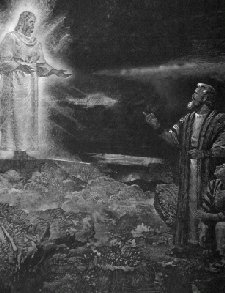When Satan Called Moses “Son of Man”
The first Sunday School gospel doctrine lesson of 2018 comes up this Sunday, and we are back to the Old Testament, which contains many puzzles for modern readers. Lesson 1 begins in the Pearl of Great Price with God’s mission statement, which came before the creation of this earth: “For behold, this is my work and my glory—to bring to pass the immortality and eternal life of man” (Moses 1:39).
Moses 1 is a great place to begin this year’s course of study, and each verse is packed with meaning. One we might tend to skip over is Moses 1:12: “And it came to pass that when Moses had said these words, behold, Satan came tempting him, saying: Moses, son of man, worship me.”
Moses replies that he is in the similitude of God’s Only Begotten Son, something he has just learned. Moses has just gotten a glimpse of God’s eternal plan.
Hebrew is a Spiritual Teacher
Hebrew is more than the language of the Bible. It is a religious teacher in its construction, patterns, and meanings. Here’s a little lesson…
adam = man
adamah = soil
adom = red
dam = blood
The phrase, “son of man,” is used commonly in Israel just to mean a male person. The phrase in Hebrew is “ben adam” (ben ah-dahm’). So, if I’m at a fast food restaurant with a friend and that friend wants me to choose a table and points to one, I could reply, “Yesh ben adam shama sh’ ochel” — “There’s a man there eating.”
“Ben adam” means… person, man, human being, mortal. If a man calls himself “the son of man” he is emphasizing that he is talking about himself.
 Moses has learned that his destiny is to be immortal. His rebuke to Satan is, “Who art thou? For behold, I am a son of God, in the similitude of his Only Begotten; and where is thy glory, that I should worship thee?” (Moses 1:13). Satan used the most common of ways to address Moses, but Moses has learned that he is far from common, as are we all. We are all destined for immortality.
Moses has learned that his destiny is to be immortal. His rebuke to Satan is, “Who art thou? For behold, I am a son of God, in the similitude of his Only Begotten; and where is thy glory, that I should worship thee?” (Moses 1:13). Satan used the most common of ways to address Moses, but Moses has learned that he is far from common, as are we all. We are all destined for immortality.
Son of Man as Used in the Bible
The phrase is used 479 times in the scriptures, an indication of its common use. According to The Son of Man Debate: A History and Evaluation by Delbert Royce Burkett, after 150 years of debate, no consensus on the interpretation of the phrase has emerged among scholars. The same phrase shows up in Greek translations of the New Testament, and Christ used it when speaking of Himself.
One instance in the Old Testament that seems to capture the imagination of scholars is this one from Daniel 7:13-14:
As I watched in the night visions, I saw one like a son of man coming with the clouds of heaven. And he came to the Ancient One and was presented before him. To him was given dominion and glory and kingship, that all peoples, nations, and languages should serve him. His dominion is an everlasting dominion that shall not pass away, and his kingship is one that shall never be destroyed.
Jewish witnesses of Christ’s teachings would have thought of the scripture in Daniel when Christ called Himself the Son of man.

Some favorite New Testament verses using the phrase are ones that touch the heart and testify of Christ’s personal ministry to us:
Matthew 8:20 and Luke 9:58—”The foxes have holes, and the birds of the sky have nests, but the Son of man has nowhere to lay his head.”
Matthew 18:11—”For the Son of man is come to save that which was lost.”
Mark 2:27-28, Matthew 12:8 and Luke 6:5—”The sabbath was made for man, and not man for the sabbath: so that the Son of man is lord even of the sabbath.”
Matthew 24:30—”And then shall appear the sign of the Son of man in heaven: and then shall all the tribes of the earth mourn, and they shall see the Son of man coming in the clouds of heaven with power and great glory.”
The Last Word Came by Revelation to Joseph Smith
The Pearl of Great Price wraps everything up and could inform 150 years of foundering scholarship on the interpretation of “Son of man.” Moses 6:57 says the following:
Wherefore teach it unto your children, that all men, everywhere, must repent, or they can in nowise inherit the kingdom of God, for no unclean thing can dwell there, or dwell in his presence; for, in the language of Adam, Man of Holiness is his name, and the name of his Only Begotten is the Son of Man, even Jesus Christ, a righteous Judge, who shall come in the meridian of time.


